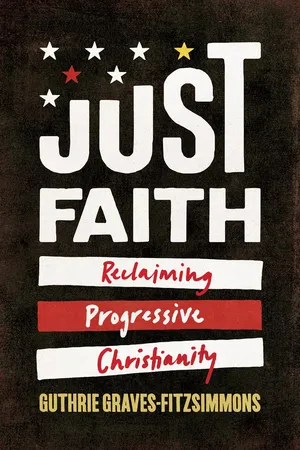
- 240 pages
- English
- ePUB (mobile friendly)
- Available on iOS & Android
About this book
According to new research from the Public Religion Research Institute, there are over 35 million consistently progressive Christians in the United States. Majorities of American Christians support reproductive justice and LGBTQ+ rights. Yet they're erased from our public narrative--only mentioned as outliers to the fundamentalist norm.
In Just Faith, progressive Christian activist and writer Guthrie Graves-Fitzsimmons explains how a strong religious left has accompanied every major progressive advance in our society, and he resurrects the long but forgotten history of progressive Christianity in the United States that can and must link arms with progressive Muslims and Jews to make the moral case for pluralism, human dignity, and the common good. Graves-Fitzsimmons provides a blueprint for this type of resurrection based on his advocacy work at the intersection of religion and American politics. Graves-Fitzsimmons creates a rallying cry for a bold progressive Christianity that unapologetically fights for its values to impact the biggest political battles of our time--from immigration and economic fairness to LGBTQ+ rights and abortion rights--so that progressive Christians will stop lowering their voices when they identify as Christians. "What kind of Christian are you?" they'll be asked. And they'll even be understood when they reply with a smile, "The good kind."
Frequently asked questions
- Essential is ideal for learners and professionals who enjoy exploring a wide range of subjects. Access the Essential Library with 800,000+ trusted titles and best-sellers across business, personal growth, and the humanities. Includes unlimited reading time and Standard Read Aloud voice.
- Complete: Perfect for advanced learners and researchers needing full, unrestricted access. Unlock 1.4M+ books across hundreds of subjects, including academic and specialized titles. The Complete Plan also includes advanced features like Premium Read Aloud and Research Assistant.
Please note we cannot support devices running on iOS 13 and Android 7 or earlier. Learn more about using the app.
Information
II
Reclaiming Our Tradition
8
Consistently Progressive Christians--In Large Numbers
Measuring the Number of Progressive Christians
- Thirty-five million American adults who have practically no voice in the mainstream media.
- Thirty-five million American adults who hear public discussion of Christianity and don’t want anything to do with what’s being described.
- Thirty-five million American adults who are ready for change.
- And thirty-five million American adults who likely don’t know there are thirty-five million American adults who share similar religious and political beliefs.
- Do you strongly favor, favor, oppose, or strongly oppose allowing gay and lesbian couples to marry?
- Do you think abortion should be legal in all cases, legal in most cases, illegal in most cases, or illegal in all cases?
- Do you strongly favor, favor, oppose, or strongly oppose allowing immigrants brought illegally to the US as children to gain legal-resident status?
| Percent of Americans Who Are Consistently Liberal by Religious Affiliation | |||
| Percent Consistently Liberal* | Percent of Population | N= | |
| All Americans | 32 | 100 | 2,020 |
| All Religiously Affiliated | 26 | 74 | 1,541 |
| White Evangelical Protestant | 9 | 17 | 364 |
| White Mainline Protestant | 31 | 13 | 311 |
| Black Protestant | 34 | 8 | 145 |
| Catholic | 30 | 19 | 422 |
| Non-Christian Religious** | 33 | 13 | 221 |
| Unaffiliated | 51 | 24 | 433 |
| Source: PRRI March 2018 Survey. | |||
| * “Consistently liberal” is defined as someone who favors or strongly favors same-sex marriage, says immigrants brought illegally to the US as children should be able to gain legal status, and reports that abortion should be legal in all or most cases. ** Includes Jews, Muslims, Buddhists, Hindus, Unitarians, and adherents of other non-Christian religious traditions. |
Table of contents
- Cover
- Praise for Just Faith
- Title Page
- Copyright
- Dedication
- Table Of Contents
- Introduction
- Our Bold Tradition
- Reclaiming Our Tradition
- Acknowledgments
- Notes